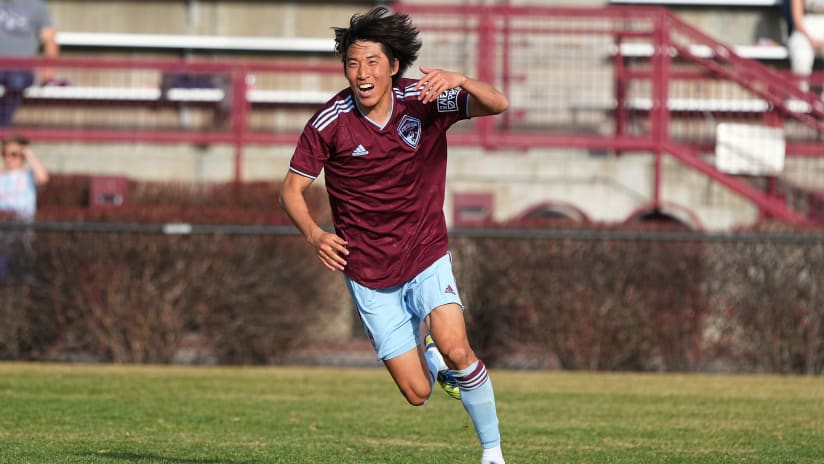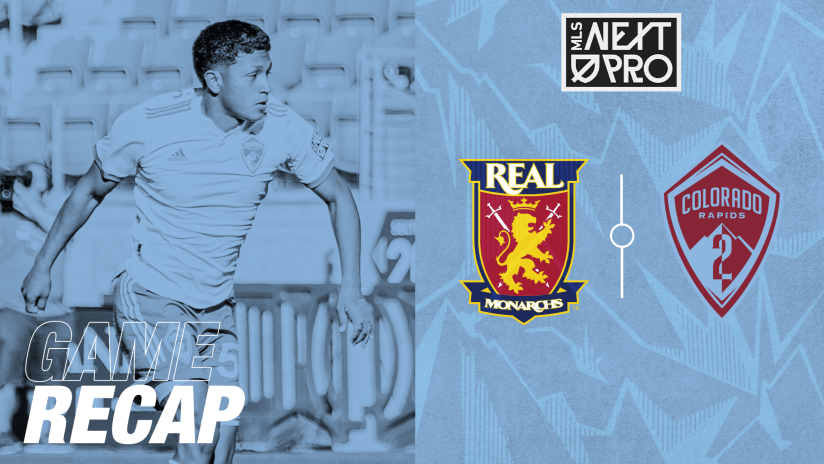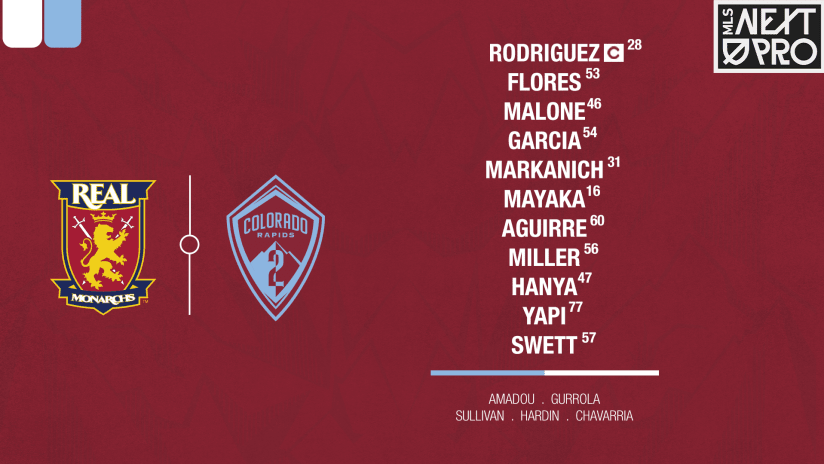Brian Reed serves as the Rapids newest Player Welfare Officer, where he leads initiatives to support the wellbeing and personal development of the Rapids First Team and Rapids Academy players, including enhancing procedures to ensure player safety and compliance with SafeSport guidelines, managing educational programming and life skills sessions, and overseeing the homestay program for Academy players, among other support services. Reed will also provide logistical and onboarding support for First Team players.
How long have you been working in soccer?
I've been working in soccer for 20 years. It all started back in 2005, after I stopped playing. I started as the color commentator for Cal State Fullerton in the athletic department for their men's and women's soccer program back in 2005. They were doing live play-by-play with an online link, so that's how it all began.
You've worked for a variety of teams and ages of players, so what led you to this specific opportunity with the Rapids?
In just those two decades, I have had a number of positions. The one thing I always found I enjoyed more than anything else, was working with people, working with young players, helping them through this pathway, and working with them on their own passion for the game. I always felt like if I had an opportunity to find a position within the game that specifically dealt with their interests, their wellbeing, just them developing as human beings and being extremely successful after the game is over - I mean, it's a dream come true, quite honestly. So much of it with coaching is wins, is losses, you get to know the players and you're tight. But you know, the machine keeps turning.
With something like this, you're really able to dive in and go so much deeper with every player. And to really know that something you do might help just that half percent, that 1%, to help get them to perform at their highest level, it's such a gratifying feeling. I had people throughout my journey, be it coaches, be it mentors, when I was a player and even coaches and mentors when I was coaching, who really went the extra mile to get to know who I was as a person. I always felt like if I had the opportunity to pay that back and then pay it forward, I would jump at the chance. Thankfully the club brought me in, and I'm really, really thrilled to be in this position.
Which of those past experiences do you think play the most into your responsibilities here at the Rapids?
We always call it the rule of 80/20. Twenty percent of the time you're on the field dealing with soccer related activities, the other 80% you're helping the players. You're helping players with lifestyle, education, nutrition. As the league has continued to pour resources into the academies and the first teams, it's on such a great growth trajectory.
Being in Colorado, I love what [our] leadership is doing in their vision for what this club can be in the next five years, in the next ten years and how it all ties into the community. It ties into the Academy, and certainly with the First Team in what they want to represent, for the Rapids, for the city of Denver, for the state of Colorado and to be a benchmark for elite soccer. I think that when you see the commitment from the club, it makes you want to drive and push forward to uncover every possible stone, to make sure that when everybody gets to the gate they have that experience like we had on Thanksgiving. We're top to bottom.
So using [that momentum from Thanksgiving] as a stepping stone heading into next season? Absolutely. Let's keep doing this. Let's keep working at an elite level and stay focused on the vision that is set forth by ownership. I've been blown away by how clean and how precise the vision is.
Can you explain what exactly your role here with the Rapids is?
Player welfare officer, it's a really interesting title, but it just encompasses everything that these players potentially need, and may need assistance with, outside of the game, “outside of the white lines” is what we like to say.
I think a great example is looking at Europe. These clubs continue to pour resources into their academies and it has to be more than just making sure they’re an elite centerback prospect or they’re an elite forward, they truly do need to become elite human beings to survive in this industry. So when you look at my role, you're talking about continuing to help those players that are pursuing their degrees, getting their coaching license, etc.
These players have so much going on. If you have a player that's coming into the country for the first time, where should they live? What do I need to do? How do I get a car? Where are the grocery stores? What can we do as a club just to make sure that those players feel that support. Every individual is unique, so it's a very broad brush. But at the end of the day, once you get to know every single player and get to know how to best support them, I think that we can start to tackle everybody's individual needs and different ways they can be supported.
Which of your responsibilities as a Player Welfare Officer have you noticed resonates the most with players as you guide them through all of this?
I suppose first and foremost is just to know this position is here at the club and to know that we care. To know that they can come to you and say, “Can you help me? Can you help me get the documents I need from the League to finish processing my loans? I just closed on a house,” or “Hey, can you help me set up a bank account?”
The players want to know that the club cares, and it's not just how they perform when they're here on site at training. They know they have people who they can rely on that represent more than just the football aspect of their lives.
What's a long-term goal and a short-term goal that you have to provide this player safety and support, and have you already implemented objectives to reach those goals?
I'd say the short-term goal is just to make sure that everybody in the club understands who I am and what I'm here to do. Thus far, I've been able to work with the Academy. We've had some fun programming and started to touch upon the DEI initiatives that the league is really trying to put forth. We've revamped the player handbook for the Academy, and most importantly, just getting to know those kids and their families and let them know that we're here because it's not just a First Team position, this position is going to have touch points all the way through our development structure. I think the messaging has been great, because it's more than just football. We're here for you more than just for how you perform on Saturday. This is something that we want to make sure continues to grow.
I feel like the long-term goal is to build out the space. I feel like there's so many things that are going to continue to come out post-pandemic and as we move forward, I feel like it's gonna have a ripple effect for years to come. When you look at the long-term goal of this position, I look forward to it being a team. A team of specialists where we earn the reputation heading into the 2026 World Cup that Colorado is a world-class destination and they take care of their players top to bottom. I feel like that's a great goal, it's a lofty goal, but to be known in MLS as one of the top two or three clubs where player welfare is at the forefront of what you do, it's exciting.
What have you seen as an obstacle(s) already while serving to provide safety and support to these athletes and how have you overcome them to ensure the players are getting the welfare they need?
Well, I feel like the only obstacle you're gonna have is gaining trust, right? It takes time to get to know people and have them let you in. This is a great business, but it's a ruthless business. So at the same time, everybody has to know that you're genuine, and that you're genuinely here to help and support. I feel like that's the only obstacle I could foresee. And once you have those relationships, and they're built on that cornerstone of being genuine and authentic, it's only going to grow from there.
Can you explain the Homestay program here at the Rapids?
Host families are something I feel like are huge for this age group. If you think about a player being asked to live on his own as a minor or as a young adult, that's so much right there. Then you're still asking them to perform, that's a mental burden. That could be extremely stressful. The host family gives them a sense of family. I think it's something that's really positive. There's so many stories where after the players graduates they still come back and have Thanksgiving dinner with the family. The family of the player, the host family, they get together. These are success stories where the human component is major. It just creates an environment of inclusion and it really does help the players have a soft landing. So it's something that I'm excited to continue to grow.
What’s your favorite story from overseeing the homestay program?
We have a family that took in a player who came from New Mexico, and they've had him since he was a U14 player, and they truly think about him as another son. So it just became almost like the home away from home for so many of the players in this because of the energy in that home. The family of the player that's here and their family, they're going to be close for decades. It's pretty special.
What do you think is the most enriching part of this homestay program for the players?
The fact that they have family to go home to. Good game, bad game, they still have what a local player gets, they get to go home to a family and they get to talk through it and get to just be a kid. So to have a family, to have that sense of normalcy, I feel like that is the key component. They're able to have what they would have had back home.
What do you enjoy about working in sports, specifically soccer?
I love it. It's a passion of mine, I've been playing since I was a little kid. My parents introduced me when I was six years old, and it's just something that's always stayed with me. Truly, aside from being with my family, I find the most joy in just being on the field around the team, collectively competing for something. There's nothing better.



